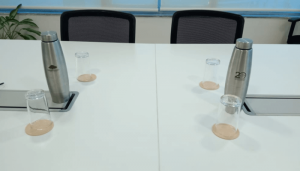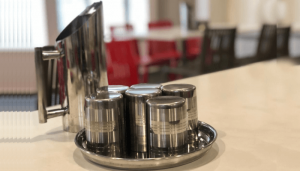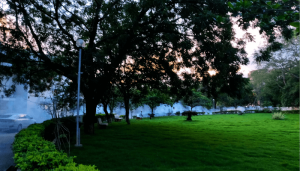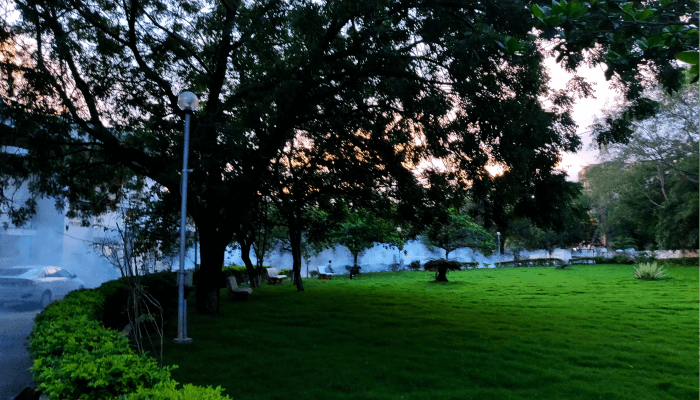In October 2018, a ban on single-use plastics was supposed to be put in place by the Prime Minister, Narender Modi – an announcement that was later put off (presumably due to the plastic industry lobby). However long before the term ‘single-use plastic’ became a dirty word, IIITH has been quietly undertaking a host of efforts in eliminating this menace. Let’s find out how a green-campus initiative has been unfolding in the direction of sustainable living.
First-time visitors to the IIITH campus are often pleasantly surprised to find stainless steel water bottles gracing desks of every staffer here. Water supplied at events such as meetings and high-profile conferences too is similarly offered in plastic-free alternatives. This is the visible result of one of the first steps taken in the direction of reducing plastic consumption at the institute-level. In fact, in a bid to replace the plastic water dispensers, efforts are being made to ensure the availability of safe and clean drinking water all over campus in the form of water fountains. But first to understand the thought process behind these sustainable measures, one needs to have a primer on the Human Values course that is made mandatory for all students, especially UG1. As part of this course, the problem of plastic pollution and finding alternatives has been variously discussed and bandied about at length by students and faculty alike. “Nobody likes a plastic-filled environment. 9 out of 10 people will probably say no to it. The only thing is that many may not be willing to take it to the next level,” says Prof. Shatrunjay Rawat, one of the most vocal crusaders of the green campaign.


Small Beginnings
It was on the occasion of World Environment Day in 2018 (June 5th), when news reports suggesting that Hyderabad produces the highest per capita waste in the country triggered thought and action in Prof. Rawat. “This dubious distinction was very upsetting and reignited a dormant thought. We all complain about environmental pollution around us. We want something to be done about it. It is our right (and easy) to ask or expect government, municipalities and others to act. I asked my colleagues if we were interested and willing to do something about it at a personal level and in our campus. Because if the answer was yes, we had plenty of opportunities around us,” says Prof. Rawat. Luckily his thoughts found resonance in other like-minded faculty and staff, one of them being the equally vocal Prof. Ramesh Loganathan who himself is a green champion and resides in an eco-friendly, self-sustaining home that is off-the-grid.
For over more than a year now, the institute has shunned water typically found in single-use plastic bottles. The anticipation of a country-wide ban on such plastic kicking in this year gave a further impetus to the slow revolution that was already underway on campus. For Prof. Rawat and Prof. Loganathan, a reduction in plastic consumption is only one aspect of a green initiative, albeit a very important one. “Our definition of single-use plastic includes anything that we open, consume and throw. Hence it doesn’t stop with the plastic carry bags that people typically assume to be the ‘only’ single-use plastics in vogue. It includes PET bottles, food containers for takeouts, chips and biscuit packets too,” says Prof. Loganathan of the institute’s move away from plastic.
More Than Just Carry Bags
One of the first steps in this direction was to initiate talks with all concerned stakeholders. And this not only included the student representatives who constitute the bulk of the residents on campus, but also the administrative staff who is in charge of the canteens and the vendors managing stalls. A survey of all canteens and stalls was conducted to understand the type of plastic-packaged products that were stocked and consumed. The idea was to explore the possibility of moving away from them and to introduce viable alternatives. After due diligence and analysis, it was observed that the canteens were voracious plastic consumers, with the consumption taking place at 3 levels – while serving, during delivery, and at the raw material or source level.

Over the course of a year or more, the institute has completely moved away from the usage of plastic for serving food prepared in the canteens. Similarly disposable containers previously used by students to pack food from the mess to carry back to their hostels have been dispensed with. Students bring their own reusable containers to get food packed in. From the raw material side of things, it was a question of giving up convenience over sustainability. “Earlier we were buying oil and ghee in 1 litre pouches for convenience sake. But there are ready alternatives available for such products in the form of large tin containers,” says Prof. Rawat. In fact he discovered that direct negotiations with the suppliers of such products led to the exploration of meaningful outcomes such as the procurement of fresh milk from a nearby go-shala in bulk, the supply of freshly-baked loaves of bread direct from a bakery, and so on. “The mess system moved away from the typical dairy milk about 7-8 years ago. With a plethora of fresh milk sources around us, it was not difficult to negotiate for the supply of fresh cow milk on a daily basis, “ says Prof. Rawat. And it wasn’t limited to just the basics like milk and bread. Think sambar powder. “Instead of buying them in little sachets, we are talking directly to manufacturers who produce in bulk and buying them in kgs in plastic-free containers.” In the case of beverages too, a shift has been made away from plastic-packed alternatives to eco-friendly ones. Freshly extracted fruit juice is now available at the stalls dotting the campus and is served in glass tumblers replacing plastic cups, minus the straws. “Juice in tetra paks is still around, but there’s a move to gradually ease those out as well. When fresh fruit juice that is hygienic and more superior in taste is available, why would anyone want to opt for the processed variety?”, muses Prof. Rawat. Apart from the messes and the stalls, a large part of the plastic menace can be traced to the bags used by food delivery companies to carry their food containers in. “For the bag, we can insist on recyclable plastic bags but for the food containers themselves, the restaurants will have to come up with alternatives such as cardboard boxes, the kind one typically finds in Chinese takeouts,” says Prof. Loganathan.

Student Community And Their Reactions
The student community is one of the biggest consumers of chips, biscuits and chocolates on campus. According to Ankit Pant, the General Secretary of the Student Parliament, anticipating a complete ban on these ‘essentials’, the student community was initially alarmed and up in arms. They came on board after being reassured that there was no immediate blanket ban on these plastic-packed items and that it would only be done in a phased manner. For chips though, Prof. Rawat seems to have a plan in mind. He asks if we’ve noticed the ubiquitous Hot Chips centres, located every few kms on the road from Lingampally leading up to Gachibowli. Considering that the students just want a seemingly endless supply of chips on campus, it would make sense to have one such Hot Chips vendor on campus frying fresh chips off a kadhai. “We asked students if they were willing to carry their own containers to take back their purchases. And they were okay with it,” he says. The Stall Committee which overlooks the management of all stalls is currently working on it. Meanwhile, vendors themselves have negotiated with their suppliers and are procuring chips in super-sized giant packs and encouraging students to carry them back in their own containers. “It helps that most of the students themselves are extremely eco-conscious, making the transition easier,” says Ankit.
Other Green Initiatives
The institute for long has maintained an organic farm, nourished with its own compost. While efforts towards reviving the farm and composting are being renewed after being temporarily suspended due to operational challenges, the kitchen waste in the form of peels and so on continues to be a source of fodder for their milk source. “We are trying to reduce our carbon footprint, and one way is by reducing our power consumption,” says Prof. Rawat. Towards this end, apart from the installation of solar water heaters a few years ago, now all the new hostels are equipped with Brushless DC fans that consume a fraction of the power typically consumed by regular fans. Regular tube lights too have made way for LED lights. Water recycling is set to get a shot in its arm by moving from recycling of grey water from the kitchens and bathrooms to recycling of blackwater from the toilets. An installation of a sewage treatment plant is underway and expected to be operational by March 2020. Rainwater too from rooftops is being collected and stored in large underground storage tanks. With the presence of a flour mill on campus where wheat and jowar flour is freshly ground once or twice a week, Shatrunjay plans on going a step further and adding a small oil-extraction unit too. “Why not have fresh kacchi ghaani ka tel?”, he smiles.
From The Personal Level To The Institute Level
Inspired by Prof. Rajeev Sangal, former Director of IIITH and founder-head of the Language Technologies Research Centre (LTRC), who he recalls as returning his plastic packed meal onboard an Air India once while travelling together, Prof. Rawat remarks,” As of Oct 2nd, 2019, I have declared my house a single-use plastic free house! I don’t shop at malls, nor do I shop online. In fact, I still go to a traditional shop, buy cloth and get it stitched by a tailor. And no, I don’t consume chips, biscuits and such processed stuff.” For him, the idea is to start a conversation around plastic and eventually get others to move away from it. In Prof. Loganathan’s view, the sheer scale of going plastic-free is staggering. “Just imagine? A 60-acre campus, 500 residents, 2000 students, day time floating population of almost 2000, 5 messes, 4 or so canteens..Whatever we can’t replace, we should recycle,” he says. Hence, waste segregation assumes priority on his scheme of things with two bins, for dry and wet waste to be set up all over the campus.
With the 3 Rs of ‘Reduce, Reuse, and Recycle’ being prioritized and put in place, the institute seems to be definitely walking the talk on the sustainability path.




Very good initiative by the Institute, Hope, Wish many of us put into practice, Almighty’s Blessings be showered upon U and all of us.
Veerabhadrudu Pabba says: